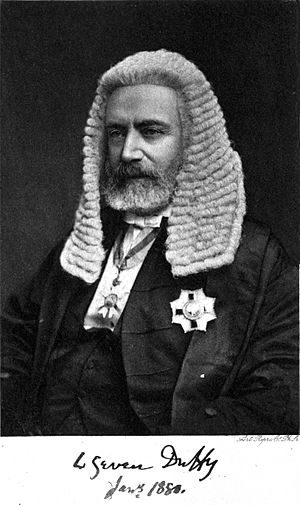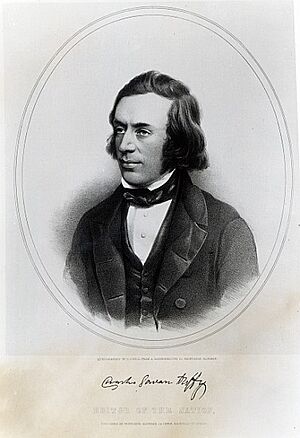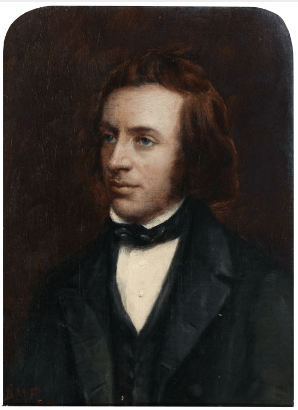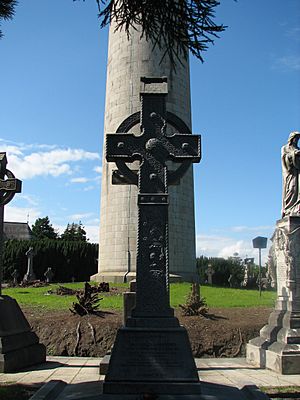Charles Gavan Duffy facts for kids
Quick facts for kids
Sir Charles Gavan Duffy
|
|
|---|---|

Duffy in 1880
|
|
| 8th Premier of Victoria | |
| In office 19 June 1871 – 10 June 1872 |
|
| Monarch | Queen Victoria |
| Preceded by | Sir James McCulloch |
| Succeeded by | James Francis |
| 3rd Speaker of the Victorian Legislative Assembly | |
| In office 22 May 1877 – 9 February 1880 |
|
| Preceded by | Charles McMahon |
| Succeeded by | Charles McMahon |
| Personal details | |
| Born | 12 April 1816 Monaghan Town, County Monaghan, Ireland |
| Died | 9 February 1903 (aged 86) Nice, France |
| Nationality | Irish - British citizenship |
| Spouses |
|
| Profession | Politician |
Sir Charles Gavan Duffy (1816–1903) was an important Irish writer, journalist, and politician. He was a key member of the Young Ireland movement, which worked for Irish rights. Later, he moved to Australia in 1856. There, he became involved in politics in Victoria. He even served as the 8th Premier (leader) of the colony from 1871 to 1872.
Life in Ireland
Early Years and Work
Charles Gavan Duffy was born in Monaghan Town, County Monaghan, Ireland. His father was a shopkeeper. Charles went to school in Belfast at St Malachy's College. He also studied at the Royal Belfast Academical Institution.
When he was 18, he met Charles Hamilton Teeling. Teeling was a veteran of the 1798 Irish Rebellion. He inspired Duffy to start writing for a journal called The Northern Herald.
Later, Duffy became the editor of The Vindicator, a newspaper in Belfast. He also began studying law in Dublin. In 1845, he became a lawyer. Before that, he became well-known for editing a book of poems. He also started a new Dublin newspaper called The Nation.
The Nation Newspaper
In 1842, Duffy helped start The Nation with Thomas Osborne Davis and John Blake Dillon. This newspaper wanted to bring back an Irish parliament. They believed this would happen by reversing the Acts of Union that joined Ireland and Britain.
Duffy wanted The Nation to unite all Irish people. He wanted it to include everyone, no matter their background. This idea sometimes caused disagreements with other leaders.
Disagreements with Daniel O'Connell
Daniel O'Connell was a very important Irish leader. He believed that religion was a key difference between Irish and English people. He wanted to protect the Catholic Church in Ireland.
In 1845, the government suggested that Catholic and Protestant students study together. The Nation liked this idea. But O'Connell disagreed, saying the bishops were against it. He called these colleges "godless." Duffy felt this was not the best way forward.
Duffy also disagreed with O'Connell about American slavery. O'Connell spoke out against slavery and asked Irish Americans to join the fight. Duffy felt this was not the right time to get involved in American issues.
The Young Ireland Movement
After Thomas Davis died in 1845, Duffy made John Mitchel his deputy editor. Mitchel's writing became more forceful. This happened as people struggled with hunger during the Great Famine.
O'Connell started to distance himself from Duffy and his group. He called them "Young Irelanders." This name came from a group in Italy that wanted change.
In 1847, O'Connell's group said that a nation should never use force to gain freedom. The Young Irelanders had not supported violence. But they argued that if peaceful ways failed, using force could be an honorable choice. Duffy and his group left O'Connell's association. They then formed the Irish Confederation.
During the terrible famine, Duffy agreed that force might be needed. He and Mitchel were arrested. Other leaders tried to start a rebellion. This was the Battle of Ballingarry. They used a new flag, the republican tricolour. Its colours (green, white, and orange) were meant to bring Catholics and Protestants together. But the rebellion was small and quickly ended.
The leaders were sent away to Tasmania. Duffy was the only one who escaped. He was freed after his fifth trial.
The League of North and South
After being released, Duffy traveled around Ireland. He saw how much people were suffering from the famine. He became convinced that land reform was the most important issue for Ireland. He believed this could unite people from different backgrounds.
In 1850, Duffy and James MacKnight formed the Tenant Right League. This group wanted "three F's" for tenants: fair rent, free sale (the right to sell improvements), and fixity of tenure (security in their homes).
This League brought together people from different religious and political groups. In 1852, Duffy and 49 other tenant-rights supporters were elected to the British Parliament. A bill was introduced to help Irish tenants. It passed in the House of Commons but was rejected by the House of Lords.
The "League of North and South" began to fall apart. In the south, some Catholic leaders accepted government jobs. In the north, meetings were disrupted.
Duffy and the Church
Archbishop Cullen was a powerful Catholic leader. He was careful about Duffy. He called Duffy an "Irish Mazzini," which was a criticism. Duffy, in turn, felt the Church was too focused on its own goals. He believed it was not supporting Irish independence enough.
Life in Australia
Moving and Starting a New Political Career
Duffy felt that the fight for Irish tenants' rights was hopeless. In 1856, he and his family moved to Australia. He was welcomed in Sydney and Melbourne. He settled in the new Colony of Victoria.
Duffy first worked as a lawyer in Melbourne. Soon, people raised money to help him buy land. This allowed him to run for the colonial Parliament. He was elected to the Legislative Assembly in 1856. He later represented other areas.
Duffy's Land Act
Duffy wanted to change land laws. He aimed to break the power of large landowners, called "squatters." In 1857, John O'Shanassy, another Irish Catholic, became Premier. Duffy became his deputy and held other important roles. It was unusual for Irish Catholics to be in such high positions in the British Empire at that time.
Duffy's Land Act was passed in 1862. It tried to give new and longer leases to farmers. But the bill was changed by the Legislative Council. This made it easy for squatters to keep control of the land. Duffy's efforts to fix the law failed.
Premier of Victoria
In 1871, Duffy led the opposition against a land tax. He argued it was unfair to small farmers. When the government was defeated, Duffy became Premier (June 1871 to June 1872). Victoria's money situation was difficult. He had to introduce a tariff (a tax on imported goods) to raise money.
Being an Irish Catholic Premier was not popular with everyone. Duffy was accused of favoring Catholics in government jobs. In June 1872, his government lost a vote in the Assembly. This was partly due to disagreements about religion. He then resigned as leader.
Speaker and Retirement
In 1877, Duffy became the Speaker of the Legislative Assembly. This meant he was in charge of running the meetings. He held this job until 1880. After that, he left politics. He moved to southern France and wrote his life story.
In France, Duffy supported the Melbourne Celtic Club. This club promoted Irish culture and self-rule for Ireland. His sons also joined the club.
He was honored for his work in Victoria. He was knighted in 1873 and received another honor in 1877. He married for a third time in 1881 and had more children.
Family Life
Charles Gavan Duffy was married three times and had several children.
In 1842, he married Emily McLaughlin. They had two children, but only one, John Gavan Duffy, survived. Emily died in 1845.
In 1846, he married his cousin, Susan Hughes. They had eight children, and six of them lived. Susan died in 1878.
In 1881, he married Louise Hall in Paris. They had two more children.
Some of his children became important figures:
- John Gavan Duffy (1844-1917) was a politician in Victoria, Australia.
- Sir Frank Gavan Duffy (1852-1936) became the Chief Justice of the High Court of Australia.
- Louise Gavan Duffy (1884-1969) was an Irish republican. She helped found an Irish language school in Dublin.
- George Gavan Duffy (1882-1951) was an Irish politician. He signed the Anglo-Irish Treaty in 1921. He later became a judge.
His grandson, Sir Charles Leonard Gavan Duffy, was also a judge in Australia.
Death
Sir Charles Gavan Duffy passed away in Nice, France, in 1903. He was 86 years old.
He is buried in Glasnevin Cemetery in Dublin, Ireland.
Works
 | Misty Copeland |
 | Raven Wilkinson |
 | Debra Austin |
 | Aesha Ash |




